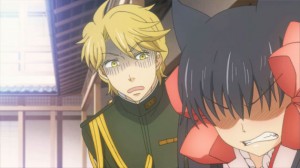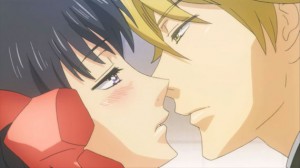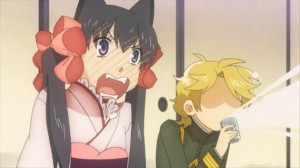![]()
This week I watched the 13-episode series Otome Yokai Zakuro, or “Demon Girl Zakuro”, on Crunchyroll. It’s based on an ongoing manga series about a half-spirit girl named Zakuro, her half-spirit and full spirit friends, and the human imperial army officers who team up with them to form the Ministry of Spirit Affairs. The story takes place in 19th century Japan shortly after the Meiji Restoration, during a time of unrest and change due to westernization. In this slightly-altered history, humans and spirits live side-by-side, but westernization efforts are marginalizing the spirits, causing conflicts to arise. And of course, there are evil spirits, too. Zakuro’s team takes requests from various parties, then attempts to nail down the problems that are occurring and resolve them.
One thing I noticed right away was that the male lead, Agemaki Kei, was voiced by Sakurai Takahiro, who also voiced my beloved Shibuya Yuuri from Kyou Kara Maou. He plays a similar character here, so his voice is pretty much the same as Yuuri’s. It was really nice to hear it again. At the end of the series, he even has a very Yuuri-esque line about people coming to understand one another. ^^
I found the setting extremely interesting. While the spirits live in a traditional-style Japanese house, and many people on the street still wear traditional garb, there were also plenty of people wearing western-style clothes, and the army officers’ uniforms were of course western-style. The characters took trains, new to Japan, to reach distant clients. Much talk was made of the “new calendar”. (Japan adopted the Gregorian calendar in 1873.) Overall, there was kind of a Victorian-meets-traditional-Japan vibe.
I loved seeing Zakuro and her friends’ reactions to things like cookies and milk. While the others were generally cheerful and open-minded, Zakuro often complained about cultural items and practices she dubbed バテレン–bateren, a word referring to Portuguese Jesuits or simply to Christianity itself. (The Crunchyroll translator subtitled it as “Jesuit”.)
The artwork was quite pretty, and the animation was very smooth. The story didn’t shy away from some particularly nasty concepts, such as a spirit that liked to eat women and children. There was some stylized violence, but not fountains of gore.
Pacing was Zakuro‘s weak point. I didn’t realize going in how short the series was, and as various concepts were introduced I imagined it would take many episodes to resolve them all. The series climax seemed to come out of nowhere, and the resolution seemed to drag while still somehow feeling hasty. With all the threads the story had woven together, we needed more time with the Ministry of Spirit Affairs to see their bonds grow, more time seeing Onodaka leading from the shadows before it became obvious who he was, more time to spin out Zakuro’s story so it didn’t feel like we had to choke down an entire buffet line of exposition during the series climax.
I did like the denouement…even the two-second, blink-and-you’ll-miss-it car passing by to answer the question of what happened after the fire. It all left me with a good feeling. (Except Zakuro’s persistent tsundere tendencies. Honey, at some point you’ve got to just roll with it.)
I also liked the flashback scenes with Zakuro’s mother, in no small part because they featured Morikawa Toshiyuki, who played Conrad in Kyou Kara Maou. He changed his voice for this part, but I still recognized him right away. Love.
I usually get a little annoyed with anime that feature twins, and I expected that to be the case here, especially when Bonbori and Houzuki told Ganryuu he should be in a relationship with both of them. But somehow they didn’t irritate me as much as I expected they would. (Maybe they would have if the series had been longer.)
I absolutely adored Susukihotaru’s relationship with Riken. I know, it’s extremely cliche: the proper lady and her strong and silent man. Shut up. It was sweet.
Agemaki and Zakuro’s relationship was great, too. I think it needed a little more time to truly flesh out before it got to “I love you”, but there were some extremely impactful moments, especially when Agemaki was captured and Zakuro found the candy ticket, and when Agemaki asked Zakuro, of all people, to come with him to deflect some of his father’s gregarious attention. If the series could have been longer, I would have liked to have seen more done with the Agemaki-Zakuro-Hanadate love triangle, and with Agemaki trying to make himself worthy of Zakuro. I’d also like to have seen more of why Agemaki fell in love with Zakuro. I think it partly has to do with how her abrasive personality paradoxically made him more comfortable being around spirits, and partly with her beauty and battle prowess, but I’m sure there’s more to it, and I would have liked to have seen that explored.
Ultimately, seeing this series has simply made me want to read the manga! I’d love to see how this story was originally told, and what other stories the author has come up with. The characters are interesting, the story is fun and complex, and the setting is fascinating.
And now, some spoileriffic screencaps:


